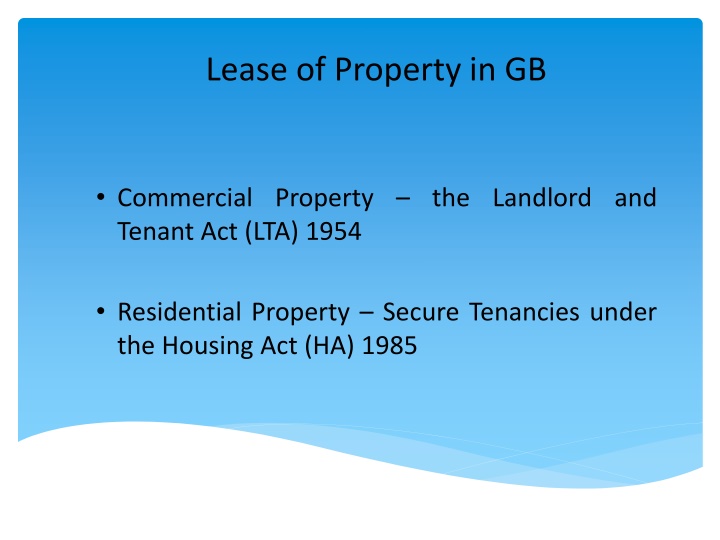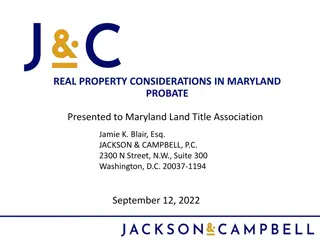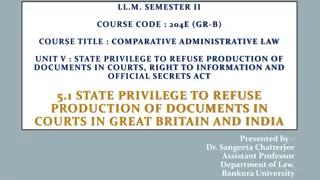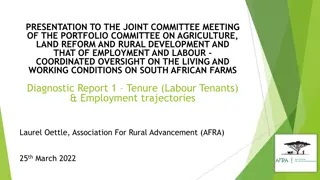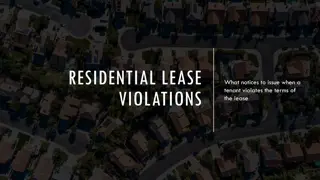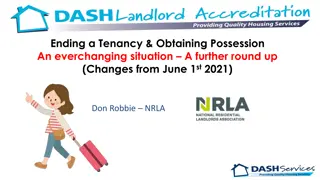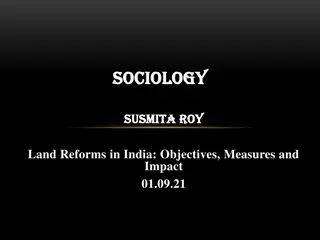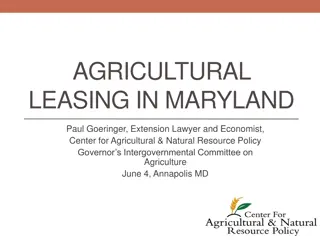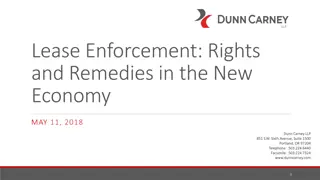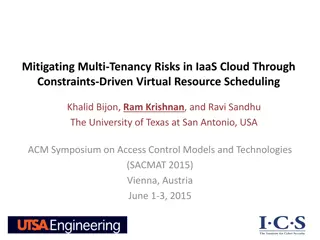Overview of Lease and Tenancy Laws in Great Britain
Understand the lease and tenancy laws in Great Britain, including the Landlord and Tenant Act 1954 for commercial properties and the Housing Act 1985 for secure tenancies. Learn about the operation of break clauses, security of tenure for tenants, and how landlords can end leases with security of tenure. Explore examples of excluded tenancies and different types of secure tenancies.
Download Presentation

Please find below an Image/Link to download the presentation.
The content on the website is provided AS IS for your information and personal use only. It may not be sold, licensed, or shared on other websites without obtaining consent from the author.If you encounter any issues during the download, it is possible that the publisher has removed the file from their server.
You are allowed to download the files provided on this website for personal or commercial use, subject to the condition that they are used lawfully. All files are the property of their respective owners.
The content on the website is provided AS IS for your information and personal use only. It may not be sold, licensed, or shared on other websites without obtaining consent from the author.
E N D
Presentation Transcript
Lease of Property in GB Commercial Property the Landlord and Tenant Act (LTA) 1954 Residential Property Secure Tenancies under the Housing Act (HA) 1985
Recovery of Commercial Property Operation of a break clause - A break clause is a provision in a lease which enables either the landlord or the tenant, or both, to end the lease early. Breach of lease Expiry of contractual term Termination of a periodic tenancy
Does the Tenant have security of tenure? LTA 1954 26.-(1) A tenant's request for a new tenancy may be made where the tenancy under which he holds for the time being (hereinafter referred to as " the current tenancy ") is a tenancy granted for a term of years certain exceeding one year, whether or not continued by section twenty-four of this Act, or granted for a term of years certain and thereafter from year to year. (2) A tenant's request for a new tenancy shall be for a tenancy beginning with such date, not more than twelve nor less than six months after the making of the request, as may be specified therein : Provided that the said date shall not be earlier than the date on which apart from this Act the current tenancy would come to an end by effluxion of time or could be brought to an end by notice to quit given by the tenant.
3) A tenant's request for a new tenancy shall not have effect unless it is made by notice in the prescribed form given to the landlord and sets out the tenant's proposals as to the property to be comprised in the new tenancy (being either the whole or part of the property comprised in the current tenancy), as to the rent to be payable under the new tenancy and as to the other terms of the new tenancy. (4) A tenant's request for a new tenancy shall not be made if the landlord has already given notice under the last foregoing section to terminate the current tenancy, or if the tenant has already given notice to quit or notice under the next following section ; and not such notice shall by given by the landlord or the tenant after the making by the tenant of a request for a new tenancy.
How a Landlord ends a lease with Security of Tenure Forfeiture s24(2) LTA 1954 Notice under s25 LTA 1954 Counter-notice to Tenant notice under s26 LTA 1954 s30(1) LTA 1954
Secure Tenancies Excluded Tenancies (examples) Long Leases exceeding 21 years Introductory tenancies Demoted tenancies Service tenancies Agricultural tenancies Business tenancies Student lettings Development Land
Unauthorised Occupiers Commercial Property - Claims against a former tenant: Expiry of a fixed term where 1954 Act is contracted out; (don t accept rent after period ends periods tenancy) Operation of Break Clause Forfeiture
Security of Tenure for Residential Tenants Security of tenure for the tenant In broad scope, the tenant of premises from which a business is carried on has security of tenure when the agreed term of his lease comes to an end. This means that, even though the fixed term of the lease has ended, tenants of business premises have: the right to remain in occupation at the end of the contractual term of a lease; and the right to apply to court for the grant of a new lease.
Grounds for regaining possession The landlord can only object to this and regain possession of the property on certain specified grounds, the most important are: 1. where the landlord requires the property back either for development purposes, or to occupy himself; 2. where the tenant has a history of non payment of rent, or not complying with the lease obligations; 3. where premises have been split up by subletting into a number of units and the whole premises would command a higher rent if let together under one lease. renewals are concluded by agreement between landlord and tenant, rather than by court proceedings. Exclusion of security of tenure The security of tenure conferred by the Act can be excluded by agreement where: the landlord intends to carry out a redevelopment; the lease is for a very short term; it is an underletting of a part of a larger holding.
Length of lease The court is not able to order the grant of a lease for a term of more than 15 years, although this doesn't stop the parties agreeing a longer term if they choose. Generally speaking the courts will be more likely to agree to the length of term requested by the tenant than by the landlord.
